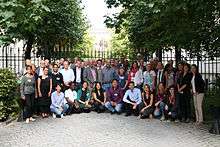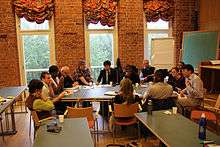Sustainable Sanitation Alliance


.jpg)
.jpg)
.jpg)

The Sustainable Sanitation Alliance (SuSanA) is a loose network of organisations who are "working along the same lines towards achieving sustainable sanitation".[1] It began its work in 2007, one year before the United Nation's International Year of Sanitation. The original intention of creating SuSanA was to have a joint "label" for the planned activities for 2008 and to align the various partner organisations for further initiatives.
SuSanA's vision document contains a definition of sustainable sanitation which was developed by the SuSanA partners in 2007.[2] There are currently around 240 SuSanA partner organisations.[3] All prospective new SuSanA partner organisations have to agree to it when they join.
SuSanA is not an NGO (non-governmental organization). It has no legal structure and takes no membership fees. It is open to others who want to join and be active in the promotion of sustainable sanitation systems. The Sustainable Sanitation Alliance encourages other organisations to join the network and to become active members in the thematic working groups.
The SuSanA secretariat is funded by the German Ministry for Economic Cooperation and Development which has commissioned the Deutsche Gesellschaft für Internationale Zusammenarbeit (GIZ) for this task. Other SuSanA partners make contributions for example by paid time of their staff members. SuSanA also has over 5000 individual members.[4]
Overview
SuSanA's goal is to contribute to the achievement of the Millennium Development Goals (MDGs) and to the Sustainable Development Goals after 2015 by promoting sanitation systems which take into consideration the five major aspects of sustainability, i.e. (i) health and hygiene, (ii) environmental and natural resources, (iii) technology and operation, (iv) finance and economics and (v) socio-cultural and institutional.
SuSanA is one of several knowledge management platform in the WASH sector such as LinkedIn Discussion Groups, Blue Planet, International Water Association (IWA) Water Wiki, Akvopedia and others.[5]
Since 2007, SuSanA has held 20 meetings (the last one in August 2015). Each year one meeting takes place in connection with the World Water Week in Stockholm and a further meeting usually takes place in the Global South, where it is connected to another WASH event. SuSanA also organises side events, seminars and working group meetings in conjunction with other major WASH conferences.
Thematic working groups
SuSanA has twelve thematic working groups covering all the main areas of sustainable sanitation where conceptual and knowledge management work is required:[6]
- Capacity development
- Market development
- Renewable energies and climate change
- Sanitation systems, technology options, hygiene and health - includes hand washing
- Food security and productive sanitation systems
- Cities and planning
- Community, rural and schools (with gender and social aspects) - includes community-led total sanitation
- Emergency and reconstruction situations
- Public Awareness, advocacy and civil society engagement
- Operation and maintenance
- Groundwater protection - includes groundwater pollution issues
- WASH and nutrition - includes issues on malnutrition
Partner organisations
SuSanA has 240 partner organisations (as of March 2015)[3] of the following types: Local NGO, International NGO, private sector, research and education, Governmental / State-owned organisation, multi-lateral organisations, associations and networks and others.[7] All SuSanA partner organisations have to agree to SuSanA's vision document before joining.
A network analysis study conducted in 2014 assessed the SuSanA network by examining the communication channels used and the quality of relationships among partners.[8] It found that "SuSanA partners have strong levels of trust, cooperation and information exchange with one another". However, partners seem to have low diversity of relationships with partners in different economic zones, such as developing countries versus developed countries.[8] Many of the partners use their membership primarily to receive information from the discussion forum.[8]
Individual members
Individuals can join as members and there are currently over 5000 members.[4]
Funding sources
SuSanA's work is in principle based on voluntary contributions and has no legal structure, budget nor income. Partners contribute time and resources from their own budgets. The SuSanA secretariat is funded by the German Ministry for Economic Cooperation and Development (BMZ) who has commissioned the Deutsche Gesellschaft für Internationale Zusammenarbeit (GIZ) GmbH. Since the end of 2012 and until end of 2015, co-funding for the internet forum is being provided by the Bill and Melinda Gates Foundation.[7][9] Several active core group partners, for example SEI, seecon, BORDA, Swiss Federal Institute of Aquatic Science and Technology, IWA, WASTE have also funded various travel costs of SuSanA members, seminars, the printing of SuSanA publications and so forth.[7]
Achievements
The activities of the SuSanA network have contributed to increasing awareness about sustainability in the sanitation sector. SuSanA members are helping to shape the post-2015 Sustainable Development Goals which may include a goal of universal use of sustainable sanitation services that protect public health and dignity. Other players have picked up on the theme of innovative sanitation (often with reuse of excreta in some form), most notably the Bill and Melinda Gates Foundation. Sustainable sanitation has become a topic in the nexus (water, energy, food) dialogue as well as in the WASH and nutrition theme.
Challenges and difficulties
SuSanA has been criticised by some in the WASH (Water, Sanitation, Hygiene) sector for a perceived dominance of the ecosan theme in SuSanA due to the strong focus of its founding organisations on ecosan: Stockholm Environment Institute and Deutsche Gesellschaft für Internationale Zusammenarbeit (GIZ) GmbH. Others have criticised SuSanA for being too focussed on technologies and sanitation systems (rather than on non-technical issues); that it is too dominated by people from the Global North; too dominated by GIZ who leads the secretariat; and too theoretical and far removed from the realities on the ground. SuSanA has no regional nodes, offices or secretariats. It also has limited impact so far in the non-English speaking parts of the world, notably Latin America, Russia or Central Asia.
The SuSanA core group has reacted to these criticisms by defining a mission statement in 2014, a roadmap for 2013 onwards and by hosting an open discussion forum where such issues can be discussed.[7]
Recommendations made in 2014 to the SuSanA network for its future development and to further develop relationships among partners include: Continue to hold meetings in different locations around the world, establish regional nodes, re-activate the working groups, and create more active members through engagement.[8]
History
SuSanA started in January 2007 with a kick-off meeting in Eschborn, Germany at Deutsche Gesellschaft für Internationale Zusammenarbeit (GIZ) GmbH, an international enterprise owned by the German Federal Government, who has held the secretariat since then. Initially the aim was to only prepare and align various organisations active in sustainable sanitation for the International Year of Sanitation in 2008.
See also
References
- ↑ "FAQ". Sustainable Sanitation Alliance. Retrieved 7 September 2015.
- ↑ SuSanA (2008). Towards more sustainable sanitation solutions - SuSanA Vision Document. Sustainable Sanitation Alliance (SuSanA)
- 1 2 "Partners". Sustainable Sanitation Alliance. Retrieved 25 March 2015.
- 1 2 "Discussion forum statistics". Discussion Forum. Sustainable Sanitation Alliance. 25 March 2015. Retrieved 25 March 2015.
- ↑ Cranston, P. (2014). Knowledge Management and Building Demand for Sanitation. Final report from a consultancy assignment for Bill & Melinda Gates Foundation (BMGF) water, sanitation, and hygiene (WASH) program, Euforic Services, Oxford, UK
- ↑ "Overview of the working groups". Sustainable Sanitation Alliance. Retrieved 3 March 2015.
- 1 2 3 4 SuSanA (2014). A standard set of Powerpoint slides to explain SuSanA. SuSanA Secretariat, located at GIZ, Eschborn, Germany
- 1 2 3 4 Saffer, Adam (2014). "Sustainable Relationships within the Sustainable Sanitation Alliance: SuSanA Network Analysis Report". University of North Carolina-Chapel Hill, USA.
- ↑ Elisabeth von Muench, Dorothee Spuhler, Trevor Surridge, Nelson Ekane, Kim Andersson, Emine Goekce Fidan, Arno Rosemarin (2013) Sustainable Sanitation Alliance members take a closer look at the Bill & Melinda Gates Foundation’s sanitation grants, Sustainable Sanitation Practice Journal, Issue 17, p. 4-10
External links
| Wikimedia Commons has media related to Sustainable Sanitation Alliance. |